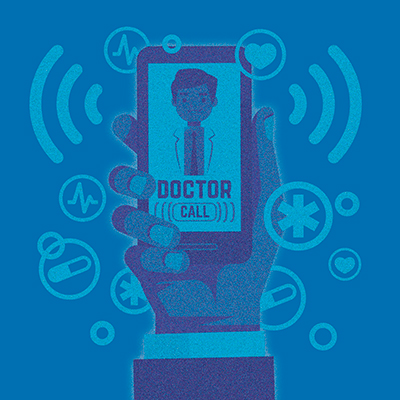Healthcare is probably the most important social entrepreneurship sector that can benefit from the innovation and zeal of young entrepreneurship and public-private partnership both of which are being actively promoted in healthcare worldwide. China’s Belt and Road Initiative (BRI) can be leveraged in promoting technology entrepreneurship in the social sector in general and in healthcare in particular. This article discusses a new multi-country and multidisciplinary initiative called mHealth for Belt and Road region (mHBR) led by the University of Michigan-Shanghai Jiao Tong University Joint Institute. The project involves the application of a range of mHealth technologies (e.g., mobile phones, drones, robots etc.) for Healthcare across the BRI region involving China and neighbouring countries.
The United Nations (UN) has recognised the need for a holistic approach of sustainable development where health, environment and social wellbeing are being targeted together through the new global Sustainable Development Goals (SDGs). In the healthcare sector, Universal Health Coverage (UHC) is the platform that seeks to overcome inequality in tackling the gap in the service provision and finance that populations face. The role of ICT (Information and Communication Technologies) to build the essential building blocks of UHC has been widely accepted. The proliferation of mobile phones in developing countries, in particular, has raised the expectation for better access to quality healthcare in a cost-effective manner. Widely referred to as ‘mHealth’, ‘mobile communication devices, in conjunction with internet and social media, present opportunities to enhance disease prevention and management by extending health interventions beyond the reach of traditional care’ and the World Health Organization (WHO) has announced that m-health has the ‘‘potential to transform the face of health service delivery across the globe”. However, achieving UHC through mHealth presents some challenges, particularly from the perspective of sustainability and management. Entrepreneurship in mHealth services provide some mechanisms to overcome these challenges.
On the other hand, China has undertaken a major initiative called the Belt and Road Initiative (BRI) for the development of the region from the western and southern regions of China through the adjacent countries towards Europe and Africa. This initiative involves developing regions (e.g., Yunnan and Guanxi provinces) of China and other neighbouring countries (Pakistan, Bangladesh, Myanmar, Kazhakastan, Uzbekistan etc.). The BRI scheme mainly funds the infrastructure development of the Belt and Road region and countries through public collaboration; however, once the infrastructure projects are done, it is important to build comprehensive social development utilising increased connectivity through people-to-people collaboration along the BRI countries and region. For this latter part, entrepreneurship has important roles to play in channeling the benefits of infrastructure and technology to the currently under-developed regions. In view of similarities in the problems for populations in this region, it may be possible to share some cost-effective solutions as well, making such collaboration all the more significant. In addition, although under-represented in the discussions on health-care so far, entrepreneurship has much potential in increasing its significance in relation to healthcare in general and mHealth in particular.
The University of Michigan (UM)-Shanghai Jiao Tong University (SJTU) Joint Institute (UMJI) Centre For Entrepreneurship (CFE) is focusing on social entrepreneurship through its initiative on Technology Entrepreneurship for Sustainable Development (TESD) by leading a new multi-disciplinary, multi-country (ten countries) project called mHealth for Belt and Road region (mHBR), as discussed in the Research Section of their website.1 As a part of this, a systematic survey was carried out on the role of entrepreneurship in mHealth in terms of four emerging major issues: sustainability, evaluation, social media, and interoperability. Sustainability in mHealth projects has become an issue because there are many pilot projects in mHealth without leading to any large scale deployment with the exception of some specialised medical devices incorporating mHealth features. There is also an issue of evaluation surrounding the debate on the suitability of expensive, time-consuming randomised controlled trials, a gold standard evaluation methodology for healthcare intervention. Some researchers are questioning this gold standard for mHealth project evaluation given the rapid obsolescence on mHealth technologies. The rapid proliferation of mobile technologies in social media, on the other hand, offers increasing number of options for mHealth solutions but since mHealth represents a class of solutions based on multidisciplinary knowledge involving many complex technologies, often mHealth solutions do not work together, leading to interoperability problems and hence the lack of effective interventions. This survey is an attempt to link the emerging issues on mHealth with the strong interest amongst entrepreneurs on the development of medical devices based on mobile technology.
The Center For Entrepreneurship (CFE) at UMJI has also brought together the works in the international initiative called mHealth for Belt and Road Region (mHBR) and led to a new program called Technology Entrepreneurship for Sustainable Development, which was initiated with the Shanghai 1000-talent Distinguished Professor Award to Pradeep Ray in 2017. Them HBR project is based on ongoing collaborations across several institutions in different countries such as Australia (UNSW, University of Sunshine Coast, UTS and University of Wollongong), Bangladesh (Dhaka University, Jessore University of Science and Technology, Yunus Centre, Grameen Shakti), Denmark (Copenhagen Business School), Norway (NTNU, KUC), Japan (Kyushu University, Redcross), Spain (Universidad Politechnica de Madrid), Thailand (Asian Institute of Technology), Shanghai (Shanghai Jiao Tong University) and other BRI Region in China (Guangxi University). The project encompasses multiple disciplines including Software, healthcare, mobile communications, entrepreneurship, business, and social development. Students, faculty, and researchers, in these different institutions and disciplines, are cooperatively investigating the technical and entrepreneurship aspects of mobile technologies (such as phones, robots, drones etc.) for healthcare development in the specified BRI regions and countries. Bangladesh has been selected as a major partner in this project because of its pioneering status in commercialising mHealth (healthcare using mobile phones) through services, such as Health Hotline 789. Guangxi province has been selected as a part of the developing BRI Region in China. The works in this mHBR project can be an illustrative example of the multi-country, multi-stakeholder collaborative approach to the development of BRI region through entrepreneurship in a popular technology (mobile) application particularly in healthcare sector. Other groups can use this as a model for future development, especially in social entrepreneurship (entrepreneurship to help disadvantaged section of the population, e.g., poor, disabled, elderly etc.)
1. Robots for elderly:
This project follows on from the EU Victrory a home2 to help overcome the loneliness of the elderly living independently using telepresence robots operated by family members using the Internet and mobile devices (e.g. laptop computers, tablets, mobile phones etc.) from geographically remote locations. The robot used in Victoryahome project proof of concept was too expensive for people in BRI region. Hence the first objective of this project is to first develop a low cost, appropriate robot for Belt and Road countries (mainly China and Bangladesh) involving entrepreneurs in the region. The project will have the benefit of the experience of related projects in the EU, Australia,and China where current partners are located.
2. Drones for disaster management:
Drones have been successfully used for rescue missions and disaster relief management in Asia, especially in Japan. This project will develop some of these cases applications in developing countries in the region. For example, resource management in the Sunderban region is of great interest to both Bangladesh and India and project partners are from Bangladesh, China, India, and Japan.
3. Portable Health Clinic (PHC):
The idea is to use mobile phones for primary healthcare in remote areas in developing countries where the doctor remotely assesses a patient remotely using a mobile phone. Such systems have undergone pilot trials in several countries including Bangladesh, China and Australia This is a well-known project with strong involvement from several countries. The project name PHC evolved from Grameen Communications and Yunus Centre work called ‘Doctor in a Box’. This project will leverage entrepreneurship amongst village health workers across the OBOR borders (China and Bangladesh) for healthcare applications using mHealth. Project partners are from Bangladesh, China, Japan, Pakistan, and Thailand.

4. Blockchain for social business:
This project deals with various aspects of the blockchain technology to help the social services sector (including NGOs) to gain the trust of the donors at minimal cost thanks to blockchain technology in mobile services. Partners include organisations from Australia, China, Denmark, Korea, and Norway.
5. mHealth for parkinsons disease:
This project focuses on the application of mobile and wearable technologies for major global chronic diseases (e.g., Parkinsons Disease-PD) that is of great importance to China as almost 50 per cent of global PD patients are from China. Researchers are working on using wearable mobile technologies to treat PD patients in very early stages. This project will focus on the use of mHealth for reducing the cost and improving the quality of life of chronic illness patients. The partners are from Australia, China, Japan, and Norway.

6. Global challenge:
While all the above projects relate to the application and deployment of a type of mobile technology, this project will deal with the development of entrepreneurship for the social development integrating above technologies in a developing country. This project acts as an umbrella for the development, deployment and evaluation of the mHealth technologies involved in the above projects. The project will carry out relevant case studies across the borders of OBOR region (e.g., China and Bangladesh) to share information (e.g., success stories and knowhow) related to the deployment of these technologies for healthcare from the perspectives of government policies, regulatory environment, entrepreneurial / business support, cross-cultural collaboration and related funding mechanisms. Partners are from Bangladesh, China, Pakistan and Thailand.
These technology entrepreneurship projects study the feasibility and deployment of various mobile technologies for the sustainable development of healthcare in developing regions, such as Belt and Road provinces of China and neighbouring countries. Each project will involve academics and entrepreneurs from China and at least one Belt and Road country (e.g., Bangladesh) to collaborate and learn various aspects of the deployment of mobile technologies in healthcare.
The whole project came to a concrete footing in September 2018 through the Entrepreneurship Week event organised by UMJI. As a first such event, it was attended by about 120 participants from 14 countries, and discussed the way forward for them HBR projects. This event led to the initial plan of mHBR in consultation with multi-national partners in academia, business, and the government and consolidated the organisation of mHBR project into six projects mentioned above, led by experts and members from ten countries including Australia, Bangladesh, China, Japan, Korea and several European countries. This mHBR group will meet again in Sept. 2019 in Asian Institute of Technology to discuss the progress of all projects and their future strategies.
References:
1 http://umji.sjtu.edu.cn/entrepreneurship/views/about.html.
2 www.victoryahome.eu